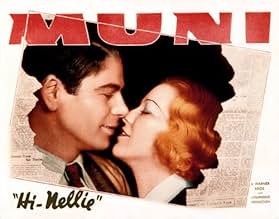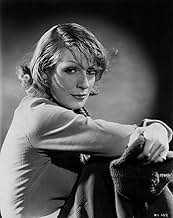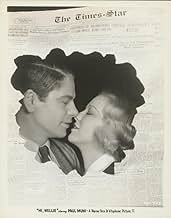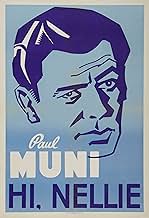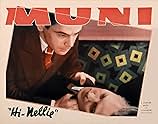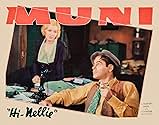AVALIAÇÃO DA IMDb
6,9/10
624
SUA AVALIAÇÃO
Adicionar um enredo no seu idiomaThe managing editor for a newspaper, in hot water with his boss, is demoted to writing the "Nellie Nelson" heart throb column, where he gets the unexpected opportunity to crack a major story... Ler tudoThe managing editor for a newspaper, in hot water with his boss, is demoted to writing the "Nellie Nelson" heart throb column, where he gets the unexpected opportunity to crack a major story.The managing editor for a newspaper, in hot water with his boss, is demoted to writing the "Nellie Nelson" heart throb column, where he gets the unexpected opportunity to crack a major story.
- Direção
- Roteiristas
- Artistas
Douglass Dumbrille
- Harvey Dawes
- (as Douglas Dumbrille)
Dorothy Libaire
- Rosa Marinello
- (as Dorothy Le Baire)
- Direção
- Roteiristas
- Elenco e equipe completos
- Produção, bilheteria e muito mais no IMDbPro
Avaliações em destaque
Paul Muni has to get used to hearing "Hi, Nellie!" when he's demoted to the Heartthrobs column in this 1934 film also starring Glenda Farrell and Ned Sparks.
When bank official Canfield disappears at the same time as $500,000 and the bank has to close, all the other papers print that Canfield took the money. Managing editor Brad Bradshaw refuses to tie the two incidences together without proof - thus, the demotion. The current Heartthrobs (Farrell) gets a news beat.
This is one of those fast-talking '30s films, probably in response to the MacArthur-Hecht "The Front Page" from 1931.
It's all pretty routine except that it stars Paul Muni who, as Brad/Nellie, is a wisecracking, sarcastic editor now mercilessly teased by his cronies.
Muni, well known for his dramatic work, shows his expertise at comedy here. Also it's a rare chance to see how handsome he was as he wore so much character makeup and so many costumes throughout his career. He is very good as the determined managing editor turned lonelyhearts columnist. Farrell is her usual sharp-mouthed self; this isn't much of a departure from other roles for her.
Recommended if you want to see Muni in something approaching a comedy.
When bank official Canfield disappears at the same time as $500,000 and the bank has to close, all the other papers print that Canfield took the money. Managing editor Brad Bradshaw refuses to tie the two incidences together without proof - thus, the demotion. The current Heartthrobs (Farrell) gets a news beat.
This is one of those fast-talking '30s films, probably in response to the MacArthur-Hecht "The Front Page" from 1931.
It's all pretty routine except that it stars Paul Muni who, as Brad/Nellie, is a wisecracking, sarcastic editor now mercilessly teased by his cronies.
Muni, well known for his dramatic work, shows his expertise at comedy here. Also it's a rare chance to see how handsome he was as he wore so much character makeup and so many costumes throughout his career. He is very good as the determined managing editor turned lonelyhearts columnist. Farrell is her usual sharp-mouthed self; this isn't much of a departure from other roles for her.
Recommended if you want to see Muni in something approaching a comedy.
Hi, Nellie is one of the most arch, hilarious movie titles I've ever encountered. At first it sounds banal, but as it's tossed around in different scenes by different characters, it gets funnier and funnier. There's a barroom scene that's a howler.
But rather than just a prop for the title's running gag, the story is quite interesting on its own. It involves a newspaper and corruption and a missing banker, and things aren't what they seem. We're taken through some amazing sets. it's impressive to see how many resources were plowed into them by the studio, from tracking shots of the cavernous newsroom, of teeming city streets, of the interior of an elaborate nightclub, all following Paul Muni, who, by the way, is a rough-and-tumble editor relegated to the lovelorn column by his publisher.
And this is a great showcase for Muni. Most of his scenes show him in closeup. Remember, Cagney had Public Enemy and Muni had Scarface, both intensely focused on their personas. I think Muni, because of his stage background, overdraws his character in movie closeups. (He may have won the Oscar for Louis Pasteur because he wore a beard that restrained his over-expressiveness.) But hey, it's Muni, and it's fun to see him do his stuff.
This is a comedy-crime flick, fast-paced, with rapid-fire dialog between great Warner players, so you have to pay attention. There's a scene where a dim young reporter tells Muni that the children's picnic he was assigned to cover didn't occur because the boat taking the kids to the venue ran aground on a sandbar and broke up, so he only had one paragraph to report. This is great stuff!
But rather than just a prop for the title's running gag, the story is quite interesting on its own. It involves a newspaper and corruption and a missing banker, and things aren't what they seem. We're taken through some amazing sets. it's impressive to see how many resources were plowed into them by the studio, from tracking shots of the cavernous newsroom, of teeming city streets, of the interior of an elaborate nightclub, all following Paul Muni, who, by the way, is a rough-and-tumble editor relegated to the lovelorn column by his publisher.
And this is a great showcase for Muni. Most of his scenes show him in closeup. Remember, Cagney had Public Enemy and Muni had Scarface, both intensely focused on their personas. I think Muni, because of his stage background, overdraws his character in movie closeups. (He may have won the Oscar for Louis Pasteur because he wore a beard that restrained his over-expressiveness.) But hey, it's Muni, and it's fun to see him do his stuff.
This is a comedy-crime flick, fast-paced, with rapid-fire dialog between great Warner players, so you have to pay attention. There's a scene where a dim young reporter tells Muni that the children's picnic he was assigned to cover didn't occur because the boat taking the kids to the venue ran aground on a sandbar and broke up, so he only had one paragraph to report. This is great stuff!
Forced to write the Heartthrobs column, the former managing editor of a big city paper finds himself exposing a story of murder & political corruption.
Fast-moving & fun, HI, NELLIE! is another example of the comedy crime picture that Warner Brothers was so expert at producing. Casts & plots could be shuffled endlessly, with very predictable results. While this assembly line approach created few classics, audience enjoyment could usually be assured. Here, the look & feel of the paper's busy newsroom is smack on the mark and the performances, even with a script that's too plot heavy, never fail to entertain.
Consummate actor Paul Muni gets a rare chance at comedy here and pulls it off brilliantly, adding just the right amount of drama from time to time. Whether he's trashing his office in a fury, fighting with his boss or going nonchalantly into the headquarters of the enemy to collect information, Muni is never less than fascinating. He is teamed with the equally watchable Glenda Farrell, playing another one of her hard-boiled dames with a heart of gold. It is obvious from the script that their two characters were once lovers, but refreshingly no time is wasted with rekindling the flames - they are just chums, wary & respectful. Their unromantic chemistry adds much to the fun of the film.
A fine cast of character actors helps move the story along. Ned Sparks plays his usual acerbic self as an investigative reporter loyal to Muni. Little Donald Meek is equally good as an aged office clerk who provides assistance on the hectic news floor for Muni & Farrell. Berton Churchill as the paper's publisher & Douglass Dumbrille as Muni's rival both score in their roles.
Robert Barrat, Harold Huber & Edward Ellis all play dangerous bad guys who must be dealt with. Frank Reicher, fresh from his double stint as the captain in the KONG movies, here plays a none-to-savvy lawyer.
Movie mavens will recognize an uncredited John Qualen as a tenement custodian.
Fast-moving & fun, HI, NELLIE! is another example of the comedy crime picture that Warner Brothers was so expert at producing. Casts & plots could be shuffled endlessly, with very predictable results. While this assembly line approach created few classics, audience enjoyment could usually be assured. Here, the look & feel of the paper's busy newsroom is smack on the mark and the performances, even with a script that's too plot heavy, never fail to entertain.
Consummate actor Paul Muni gets a rare chance at comedy here and pulls it off brilliantly, adding just the right amount of drama from time to time. Whether he's trashing his office in a fury, fighting with his boss or going nonchalantly into the headquarters of the enemy to collect information, Muni is never less than fascinating. He is teamed with the equally watchable Glenda Farrell, playing another one of her hard-boiled dames with a heart of gold. It is obvious from the script that their two characters were once lovers, but refreshingly no time is wasted with rekindling the flames - they are just chums, wary & respectful. Their unromantic chemistry adds much to the fun of the film.
A fine cast of character actors helps move the story along. Ned Sparks plays his usual acerbic self as an investigative reporter loyal to Muni. Little Donald Meek is equally good as an aged office clerk who provides assistance on the hectic news floor for Muni & Farrell. Berton Churchill as the paper's publisher & Douglass Dumbrille as Muni's rival both score in their roles.
Robert Barrat, Harold Huber & Edward Ellis all play dangerous bad guys who must be dealt with. Frank Reicher, fresh from his double stint as the captain in the KONG movies, here plays a none-to-savvy lawyer.
Movie mavens will recognize an uncredited John Qualen as a tenement custodian.
Muni takes a break from all the heavy-breathing dramas he was turning out at Warners for this lively newspaper yarn, which takes an odd turn about halfway through. At first it's a "Front Page"-style comedy, complete with bustling newsroom, huffy editor, and speedy copy boys. Muni's demoted from managing editor for mishandling a story and relegated to taking over Glenda Farrell's lonely-hearts column (see also Montgomery Clift in "Lonelyhearts," a couple decades later). Oddly, these two bickering reporters don't romance each other. After being miserable in his new position and getting self-pitying drunk, he braces up and becomes the world's greatest lonely hearts reporter (thus all the "hi, Nellie!" mirth, which comes off today as homophobic and unkind). But then we transition into a convoluted newspaper drama, with Muni and the newsroom-a fine Warners bunch, with Donald Meek, Ned Sparks, Douglas Dumbrille-chasing down a missing executive and pursuing an unlikely course through Houston Street, Little Italy, and Greenwood Cemetery. It becomes less interesting, but Mervyn LeRoy, working at a furious Warners pace, keeps it brisk, there's a swell deco supper club set with a full-size carousel, and even the main-credits theme is memorable. Not top-drawer Warner Brothers, then, but enjoyable middle-drawer.
Bette Davis is quoted as once saying that the great character actor Paul Muni tried to hide himself under all kinds of makeup, so that no one would ever know who he was or what he looked like. Well, in many of his early films, the real Muni is quite visible. Here, Warner's one time "resident thespian" does a slick turn as the managing editor of a big city newspaper. He gets demoted to writing an advice to the lovelorn column and spends the rest of the film trying to get the goods on a gang of hoods, hoping it will get him his old managing editor's job back. Glenda Farrell plays his female antagonist while sour face Ned Sparks is along for the ride as a city beat reporter. A solid role for Muni, with lots of comedy, which he pulls off well. I suppose the comedy was a welcome change from his usual heavy drama, falling somewhere between "I Was a Fugitive From a Chain Gang", "Scarface" and "Louis Pasteur." Watch and enjoy Muni's talents. His 5 Oscar nominations should speak for themselves, but it seems, over 30 years after his death, he's not as well remembered as several of his contemporaries, which is a shame.
Você sabia?
- CuriosidadesFilmed in 1933, but not released until January 1934, narrowly escaping the menacing slash of the Production Code.
- Erros de gravaçãoAt the Merry-Go-Round club, Leo removes Sheldon's hat. But, in the next long shot with Brad and Shammy looking on, Sheldon's hat is back on. Plus, he's slumped over and his face is not visible, so Shammy couldn't identify him. In the next shot, Leo has Sheldon's hat in his hand again.
- Citações
Samuel N. Bradshaw aka Brad: [upon leaving J.L.'s office after being fired] I'll be suing you.
- ConexõesEdited into Anjos de Cara Suja (1938)
- Trilhas sonorasHi, Nellie
(1934) (uncredited)
Music by Allie Wrubel
Played during the opening credits and at the end
Also played when Shammy spots Sheldon at the Merry Go Round Club
Principais escolhas
Faça login para avaliar e ver a lista de recomendações personalizadas
Detalhes
- Data de lançamento
- País de origem
- Idiomas
- Também conhecido como
- Hi, Nellie
- Locações de filme
- Empresa de produção
- Consulte mais créditos da empresa na IMDbPro
Bilheteria
- Orçamento
- US$ 223.000 (estimativa)
- Tempo de duração1 hora 15 minutos
- Cor
- Mixagem de som
- Proporção
- 1.37 : 1
Contribua para esta página
Sugerir uma alteração ou adicionar conteúdo ausente

Principal brecha
By what name was Olá, Nellie! (1934) officially released in India in English?
Responda
